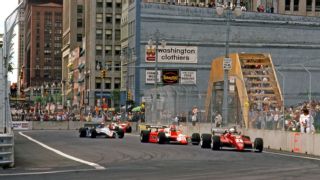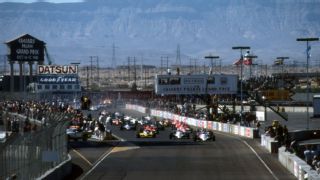|
If plans for a Grand Prix in Miami are eventually approved, this will make the 11th different venue for a championship Formula One race in the United States. The Miami City Commission would be best advised to think only of the future rather than investigating what happened in the past. The success of previous races is as varied as the circuits chosen to showcase F1 in such an important market. Setting aside permanent tracks such as Riverside, Watkins Glen, Indianapolis Motor Speedway and Circuit of the Americas, the temporary venues were, by and large, either functional and fun or a disaster surrounded by chaos and concrete. Detroit initially seemed doomed to be part of the latter category. Anxious to polish the tarnished image of a once great metropolis, the authorities pushed forward the idea of a Grand Prix along the riverfront and through the downtown streets in June 1982. Unfortunately, they failed to convey much of the detail to the local businesses. There was outrage on the first day, Thursday, when office workers found their regular commute blocked. The entire scene descended into complete disarray when a proposed F1 acclimatisation session was abandoned because the teams demanded changes to the tyre barriers and escape roads. Having secretaries snag their tights against the rough edge of concrete walls was one thing; to suffer such indignity and inconvenience for no apparent reason as the track remained silent, quite another. Friday's edition of the Detroit Free Press made uncomfortable reading at the F1 breakfast tables.  Not so Monday's reports as the Grand Prix was heralded a spectacular success in the midst of merriment. The drivers may have been divided in their view of racing on very bumpy grid-pattern streets and dealing with unusual hazards such as a railway crossing, but the crowd loved it. The nearby automotive industry, although in decline, had grabbed the opportunity to entertain and party in the office buildings towering over the track. The atmosphere was electric. And continued to be so for the next six years before funds ran out to make necessary changes to the open pits, some distance from the garage in Cobo Hall. Long Beach, a brilliantly successful concept that formed the street circuit template in 1976, would have continued beyond 1983 had organiser Chris Pook not had the temerity to rail against Bernie Ecclestone's demands for even higher fees. Other temporary venues tried and failed miserably. Caesars Palace was doomed from the moment someone thought a flat track zigzagging through the hotel's open car park would attract punters from the air-conditioned comfort of the gambling halls to the searing heat of open grandstands.  Dallas actually produced a challenging layout in 1984 and F1 enjoyed the Texas welcome just as much as a substantial crowd embraced a race skirting the Cotton Bowl Stadium. But the surface broke up in the July heat and future prospects were terminally affected when a key member of the organisation absconded with the cash box. Phoenix had none of that. In fact, it didn't have much of anything when introduced to the F1 calendar as a replacement for Detroit in 1989. The streets were wide and reasonably smooth; the conversion to a race track causing comparatively little disruption. According to the Phoenix Gazette, the major issue had been the re-siting of a bus stop for the service to the local zoo. Wildlife, in fact, would provide an unfortunate statistic that summed up why the race would see out only three of its proposed five years. A mere 31,411 spectators paid to watch in 1989. When the Gazette reported that an Ostrich Festival attracted a bigger crowd than the race in 1991, the future of the Phoenix Grand Prix was sealed. Who knows what lies in store for Miami? The final race weekend in Phoenix got off to a bizarre start when a man managed to evade security and hobble onto the track during first practice, brandishing one of his crutches at a fast-approaching F1 car. The irate citizen was fortunate not to be returned sooner than planned to the hospital from which he had just been released. Miami: you have been warned.
|
